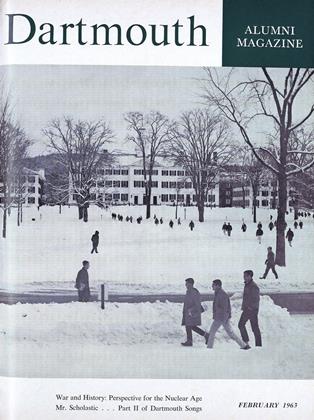By Page Smith '40. NewYork: Doubleday, 1962. 2 vols. $14.50.
Any gentleman with $14.50 and room for two handsome volumes will do well to purchase this important biography of John Adams written by Page Smith, Dartmouth 1940. The volumes will shed distinction on whoever owns them, whether read or not. But sooner or later they will be read if their owner has interest in American history and particularly in that remarkable period when the country, scarcely aware of the industrial revolution then beginning, was keeping to its old ways but laying the political foundations which preceded its economic greatness.
No man was more concerned with those foundations than John Adams, though some of his contemporaries became more famous. No one was harder to get on with. He became dissatisfied with Franklin and Washington, hated Hamilton, and fell out - but not for good - with Jefferson. He was learned, clear-sighted, practical, unremitting, and irascible. He was the first Vice President, the second President, and father of the fifth President; he was the husband of a gifted wife, and progenitor with her of a family distinguished for generations; and yet in his 64th year, when closing his bitterly factious Presidency, he wrote: "My children give me more pain than all my enemies."
Only since 1954 have the Adams papers been open in full, and Professor Page Smith's work is the first major fruit of their release. He presents his material with interpretations that seem to me to increase impressively Adams' importance among his contemporaries but not greatly to change judgments of him and of them otherwise. He makes Adams better known, more interesting, and a domestic figure as well as public. He admires Adams, he is temperate with Adams' enemies. His narrative has fluency; it keeps family and public life entertainingly interwoven through a long, difficult, momentous career abroad and at home.
By happy necessity the work is also a biography of that wise, capable, affectionate, and saucy creature, his wife Abigail, who rebukes the President of the United States for opening her letters — which he lamely excuses himself for doing because he finds them so interesting - who longs for him in his absences, and who is his adviser in affairs of state. The press criticized official acts of his in her absence, which, had she been by, it was said, she would not have let him do. He, an old-fashioned agrarian, preferred to invest in land; she, with canny modernity, put her savings in securities.
My praise of the biography is qualified with complaint of faults, chargeable mainly to the publisher, no doubt, for the absence of a table of contents, of chapter headings, of chronological guides, of accessible citations, and of helpful running heads. Slips are frequent, such as the poet "Thomason's Seasons," "Vivre le roi," and "Convent Garden," London. Peter Porcupine is several times mentioned but never identified as William Cobbett - unless I nodded where the author of the index did. But these are blemishes which cannot abate the narrative's importance and lively interest. The work is a major accomplishment.
 View Full Issue
View Full Issue
More From This Issue
-
 Feature
FeatureDARTMOUTH SONGS
February 1963 By HAROLD F. BRAMAN '21 -
 Feature
FeatureAND MANY DARTMOUTH YESTERDAYS
February 1963 By Edward Connery Lathem '51 -
 Feature
FeatureWAR AND HISTORY
February 1963 By LOUIS MORTON -
 Feature
FeatureMR. SCHOLASTIC
February 1963 By CLIFF JORDAN '45 -
 Class Notes
Class Notes1931
February 1963 By WILLARD C. "SHEP" WOLFF, JOHN K. BENSON -
 Class Notes
Class Notes1935
February 1963 By WM. W. FITZHUGH JR., DAVID D. WILLIAMS
Books
-
 Books
BooksAlumni Articles
October 1956 -
 Books
BooksJONES VERY: THE EFFECTIVE YEARS,
NOVEMBER 1967 By EDWARD M. POTOKER '53 -
 Books
BooksALUMNI PUBLICATIONS
March 1920 By F. L. C. -
 Books
BooksCONTRABAND
June 1936 By Henry M. Dargan -
 Books
BooksForm and Message
JUNE 1977 By RUDI BLESH '21 -
 Books
BooksDEMOCRACY FIGHTS: A HISTORY OF NEW HAMPSHIRE IN WORLD WAR II
May 1951 By WAYNE E. STEVENS


